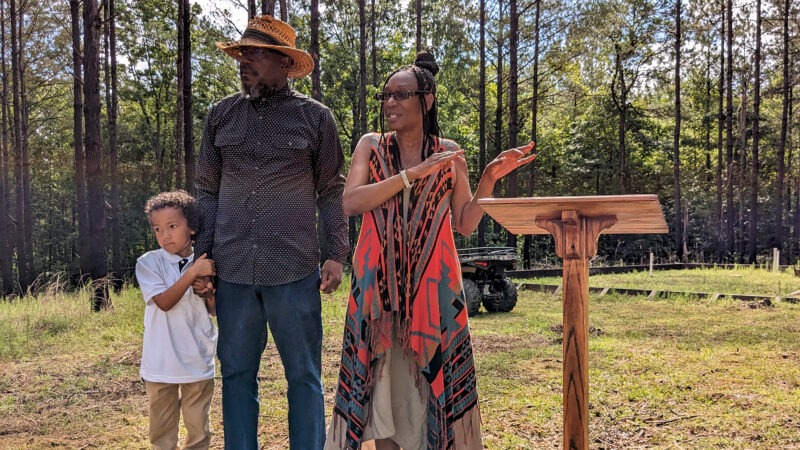Deadline approaches for USDA loan discrimination funds for underserved farmers
Kevin Springs stands between his wife, Teresa Ervin-Springs, and his grandson at their farm, TKO Farms, on June 19, 2023, in McCool, Mississippi. The couple has broken ground on a future training center on their farm to preserve ancestral Black farming knowledge.
The deadline for financial assistance for farmers who’ve faced discrimination when applying for United States Department of Agriculture (USDA) farm loans comes Saturday, January 13.
Known as the Discrimination Financial Assistance Program (DFAP), $2.2 billion in funding is available as part of the Inflation Reduction Act, a federal law passed in 2022. USDA started accepting applications for the program in July.
Five local offices in Alabama, Mississippi and Louisiana were created to help people apply. The last week of accepting applications has been busy with trying to meet the deadline, said Howard Gunn Jr, an agriculture consultant with Ag-Grow Consultants who’s been hands-on in Mississippi.
“It has been a whirlwind. [There’s] so much need out there, and I know it won’t cover all the needs of the people,” Gunn said.
The program is just one effort to acknowledge decades of discrimination during the loan process for women and minority groups. Black women, in particular, experienced a lot of barriers in getting this kind of funding, Gunn said. This is because they are at the intersection of racial and gender discrimination, according to One Earth, a nonprofit focused on climate action.
Even with this type of historic investment, advocates believe more needs to be done to address the systemic issues Black farmers face when trying to access USDA funds. DFAP is a step in the right direction, Gunn said, but “it can never pay back what was lost when it comes to farmland and the opportunity to farm.”
“On many instances, you look at the economic loss that occurred from the 70s or in the 80s,” Gunn said. “Had I received the funding that I went in requesting, how far would I have been?”
For some, the aid has come too late. Some farmers who deserve the funds have already died. But Gunn said people like him are signing up as many people as they can.
“This is a help. I don’t know if anything else will ever come this way in this fashion, but it’s here, and we are doing our best to put the word out,” Gunn said.
This story was produced by the Gulf States Newsroom, a collaboration between Mississippi Public Broadcasting, WBHM in Alabama, WWNO and WRKF in Louisiana and NPR.
40 years after ‘Purple Rain,’ Prince’s band remembers how the movie came together
Before social media, the film Purple Rain gave audiences a peak into Prince’s musical life. Band members say the true genesis of the title song was much less combative than the version presented in the film.
Park Fire in California could continue growing exponentially, Cal Fire officer says
Cal Fire has confirmed that over a hundred structures have been damaged in the Park Fire, which grew overnight near Chico, Calif. Difficult firefighting conditions are forecast through Friday night.
Checking in with Black voters in Georgia about the election, now that Biden is out
Some voters who could be key to deciding who wins Georgia. What do they think about Vice President Harris becoming the frontrunner in the race to be the Democratic nominee?
Tahiti’s waves are a matter of ‘life and death’ for surfing Olympics
Tahiti's Teahupo'o wave has a slew of riders for the Paris 2024 Olympics. NPR finds out why it's called one of the most dangerous waves.
Researchers are revising botanical names to address troubling connotations
Since the mid-1700s, researchers have classified life with scientific names. But some of them have problematic histories and connotations. The botanical community is trying to tackle this issue.
A spectacular opening ceremony wowed a global audience despite Paris’ on-and-off rain
The Paris Olympics opening ceremony wowed Parisians, fans and most everyone who was able to catch a glimpse of thousands of athletes floating down the Seine to officially begin the Games.



